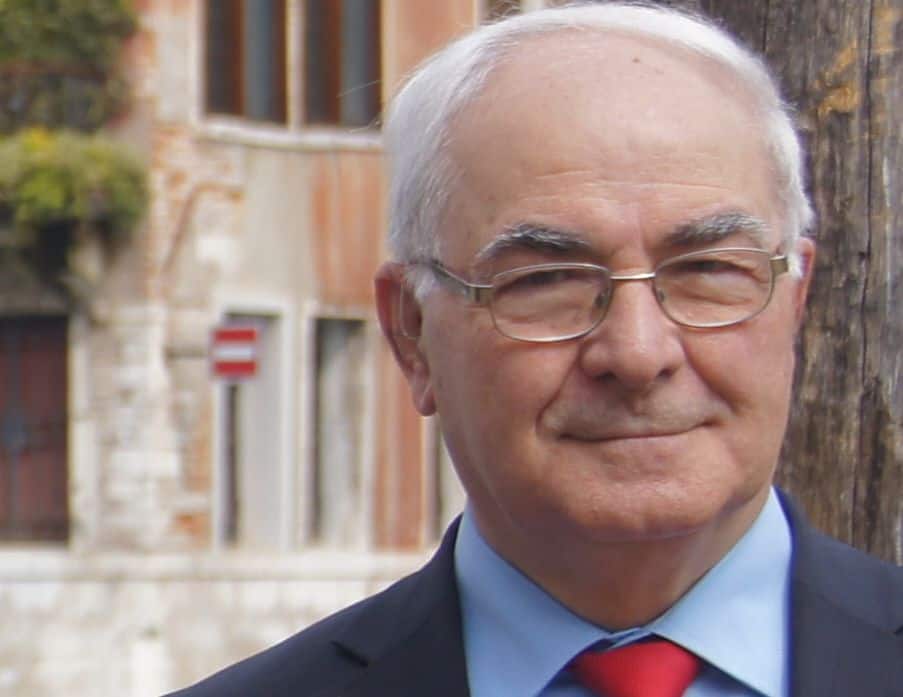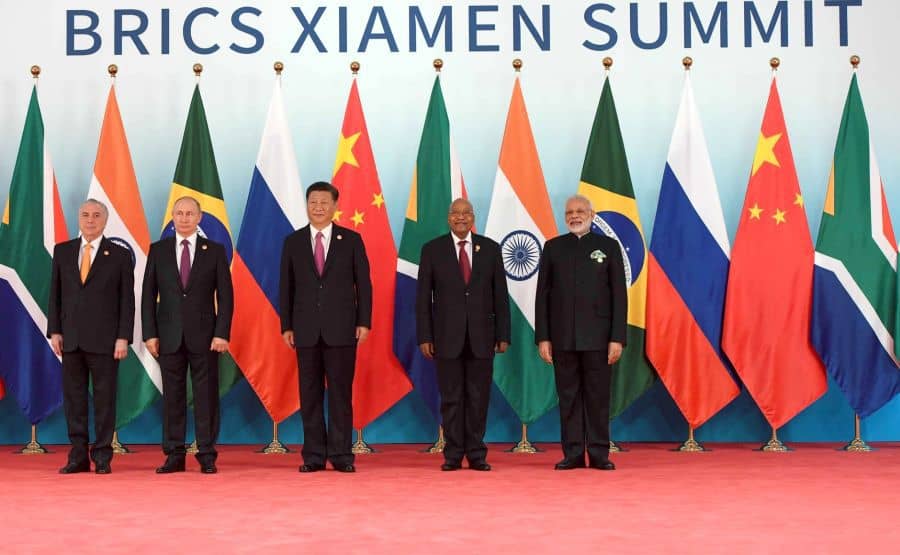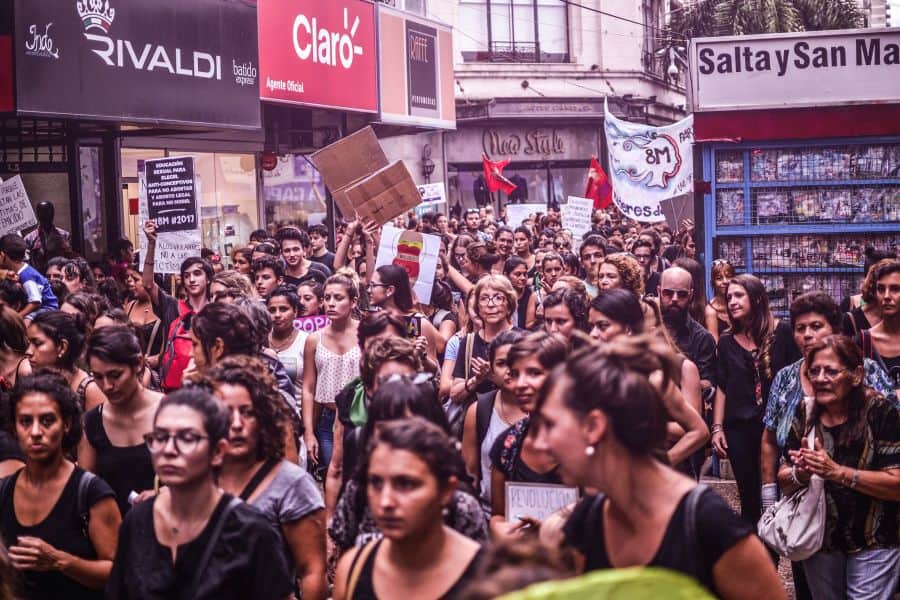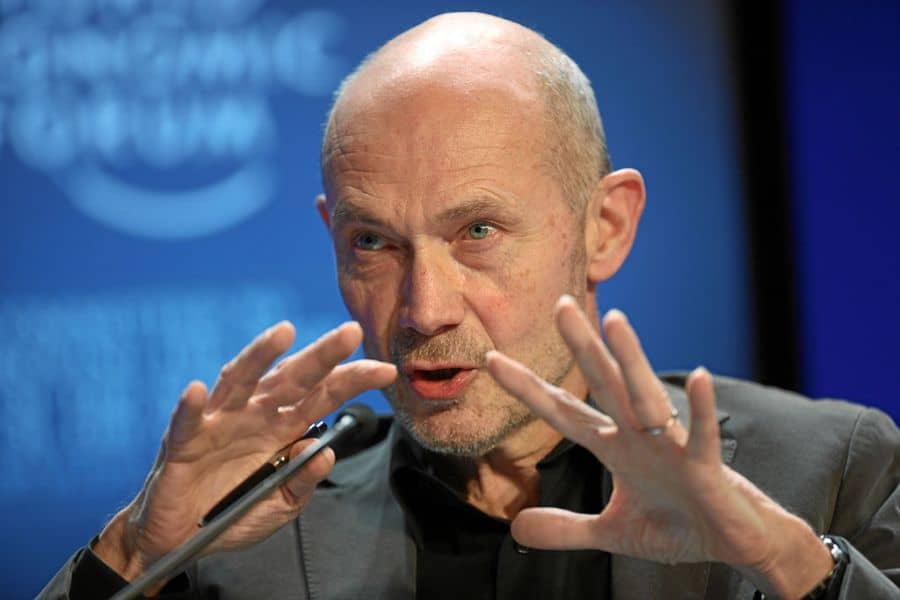
Riccardo Petrella is an Italian economist who has been a scientific and technology policy analyst to the European Commission between 1979 and 1995, becoming witness and a voice of dissent over the EC’s definition of Europe as a union of competition. He is the main force behind the report “Limits to Competition” by the Group of Lisbon that has criticised the neoliberal reforms undertaken by the Commission of Jacque Delors, that serve the capital and markets, but undermine the achievements of Post-War Europe. Petrella has worked between 1967 and 1975 as a scientific secretary, and then the director, of The European Coordination Center for Research and Documentation in Social Sciences in Vienna – an organisation that has brought about scientific exchanges between the West and the East in the times of the divided Europe. The Italian university professor teached between 1982 and 2005 in the Catholic University of Leuven (Belgium) courses such as „Scientific and technologic politics” and „Economic globalisation” and was a lecturer in other universities and countries too. Between 2005 and 2006 he was the president of the Water Company of Puglia (Italy). In 1997 he founded the International Committee on the World Water Contract, which has the former Portuguese president Mario Soares as a president. In 1998 Petrella published „The Water Manifesto” (first in French and in 2001 in English), where he uncovers his vision for water as a „common good”.
Mr. Petrella, You have had the chance to work in Vienna in the times of the detente between the West and the East in the 70s. You can probably make a lot of comparisons between those times and the present, when once again there is a lot of confrontation between the West and the East. How much has the world changed when you look at today’s international situation through the prism of the 70s?
The most important cataclysm and change in the 70s was in the financial system. In 1971-1973 the international financial system that was built after the World War Two collapsed. An entirely new world started being worked out and implemented.
The previous financial system was based on rules established by the World Bank and by the International Monetary Fund, on fixed exchange rate between the dollar and the other Western currencies. The dollar was the only one international currency and everything had to be convertible to dollar. National authorities and the control over the monetary activity of the nations were sovereign. National banks were public, most of the credit-saving banks were public and only commercial and financial activities were done by private banks, that every bank had been submitted to regulation (e.g. the agricultural bank couldn’t do industrial bank lending). This was a financial system, centered on national sovereignty, within the limits of the global Western dominance through the dollar as an international currency. When you control your money, then you can establish your own private and public investment policies.
But after the crisis of 1971-1973 the dollar was no longer the international currency that was fixed to gold. The exchange rate became flexible and the instability of the exchange rate created the currency market. You could make money buying or selling Swiss franc or Dutch gulden, which was not possible before. It means that currency became a commodity. The national sovereignty on currency decreased. The national banks still continued to produce currency, but the value of the currency in circulation was established by the financial currency market and was no longer the function of the interest rate of the national monetary authority.
Gradually, in the 80s and the 90s all the financial activities were privatized, all the saving banks have been privatized, all the public activities disappeared. The national banks themselves became private enterprises, with a few exceptions. And the value of the currency was determined by only a group of the big private banks, and not by the central banks, which was only reacting to the markets.
This meant that the national state lost the control of the monetary tool and therefore the control of all the monetary economic policy. The main financial operators became the large mergers of big national banks. Today 12-13 global banks dominate all the financial markets. With the exception of China and the USA, and partly the German government the others have lost any control of their economic policy. The financial ministries have only the power to notify what has been decided by the markets.
Today global financial economy is characterized by structural volatility. Every 4-5-6 years there is a financial crisis. It is also a criminal system, as showned by frequent large scandals of the big banks doing illegal things and are condemned to fines in billions of dollars. This financial system responds only to the optimization of the financial returns for the investors. Investors are the most powerful interest group as you can see by all sorts of bilateral trade and investment treaties such as TTIP. According to the ISDS system for Investor – State Disputes Settlement in these treaties the states have no power.

So this is an entirely new financial system. It is a crisis-prone, criminal-prone and inequality-prone system, in the sense that it generates by itself crisis, inequalities, illegality.
Was the financial change the only major change in the world which you witnessed in the 70s and later?
The financial transformation was accompanied by another global change which started also in the 70s – the new technological revolution, called The Third Industrial Revolution – the information and biotechnological revolution. A lot of new terms appeared in the 70s and the 80s – biosociety, infosociety, information-based economy. All these terms were signs of deep change, channeled by technology. These changes influenced all the spheres of the economy – including in procreation of new babies, definition of death, in personal identity documents. This revolution allowed for enormous space conquest, for the creation of new materials, for artificial intelligence, it influenced the arts.
The result was that everything was transformed fast into a commodity. Today more and more things on which our life depends are no longer natural. The tomato is man-made, air, water, everything is now subject to technology transformation. Now we are the creators of life. The GMO are only a small revolution in comparison with the man-made microbes. We can do microbes that are not genetically modified preexisting ones, but have never existed naturally. We can reproduce animals genetically. The day will come when we can make animals that have not existed before.
There is more and more individualization of life and interests, a result of the financial and technological changes and therefore conflicts for power and survival. Life will more and more lose its sense of a collective chef d’oeuvre. But creativity can’t be individual, it is always shared. Hence, the increasing collective identity crises and growing violent forms of xenofobia.
Is there another important change of the last 4 decades? What about the international affairs?
The third mega change is that the ”global order” has entered into crisis.
The USA believes the 21 st century will be again American, because they will continue to be the global military and technological leader. They continue to be the world`s leader, because of the technologization of the military activities. In their own country they consider that to have arms is a fundamental right, meaning the capacity to defend. In the same way they think that the only way to protect the freedom of their people is for them to be armed. They will never abandon their strategy of pushing for military and technological leadership of the world.
You must remember that in the last 50 years they are the only country which has 1005 military bases outside the country. It would take a lot to abandon these bases across the world. It is even unthinkable to them. That is why Trump is a domestic reaction to the fact that some part of the public opinion has accepted the relative decline of the leadership of the US. A lot of people have supported Trump who advocated the idea that the US must resettle the leadership, which is in his view a natural leadership of the nation upon the other nations. That is why white suprematist ideas exploded recently in the US.

In the last 15 years, Russia and China have changed. A lot of people talk also positively about BRICS – an acronym for Brazil, Russia, India, China and South Africa. Among these countries, however, there is no unity. They have only one common interest – to contribute to the reduction of the global leadership of the US. I don’t see China being an ally of India. Neither India is to be an ally with Brazil or South Africa. China is the greatest candidate to replace the USA by 2050 or 2070 in world leadership, but China is not thinking about a new world for all the forecasted earth’s population – 8 billion people by 2023. It is thinking about its own people, its own capacity to control the international elations. Nor the US as such an agenda. Their agenda is “What is good for us, is good for the world”.
So the last four decades were period which led to the situation that there is no strong community working for an agenda for the world. There is only the agenda of domination. This happens even though technologically speaking, we could have an agenda for the world. We could let people not die from famine, thirsty. We have 4 billion people living in areas without safe and regular access to drinkable water. We live in world without an agenda for itself.
What worries you most about today’s world?
Finance, which has taken the overarching role as a regulator. But finance is an instrument, not a goal. The role of finance is to collect spare money and to transform it into investment. They don’t do anything of this. 30% of today’s financial transactions are high-frequency transactions that take place within millions of seconds and are generated by algorhythms. This means that finance is no longer a relationship between savings and investment. It is just a technological reproduction not of life, but of might (the ability to force others to do what you wantagainst their will, with might being opposed to power which is rule in agreement, mutual respect and interdependence – note of the editor).
Ask the IT specialists who designed the software for these high frequency transactions what is the purpose of their program. They will say it is to scalp the value of a financial product in a millionth of a second. This is finance today – scalping.
Is there anything positive about the global development of the last four decades?
Yes. I am thinking of thee processses in particular.
First, the birth and consolidation of a global social force represented by women. This social force, popularly expressed by the “Women World March” has been growing beyond, but not dissociated from, gender issues. On 8 March 2017, the women movement has been able to successfully organise the first labor global strike in the world history. The traditional labour trade unions from the “North” and the “South” never did it. The women global movement has still a long way to make but they started and it will be difficult to stop their march. This is new, and a great source of encouragement and hope for future developments.

Second, the emergence of a new generation of political leaders and grass roots movements in Latin America countries such as Mexico, Chile, Bolivia, Ecuador, Venezuela, Brazil, Paraguay. Starting from the 70s these countires have been among the most innovative laboratories of social and political changes in the world. Chavez, Lula, Lugo (and Zapatist movement) had the courage to re-nationalise oil and other natural ressources that before were in the hands or under control of private multinationals, namely USA ones. They did so with the aim to finance innovative poverty eradication programmes (such as Lula’s “Fome zero” initiative or Chavez’s decision that half oil revenue was to be shared with poor families). Morales, Correa and others leaders have been the first leaders of indigenous origin who “discovered” their destroyed identity and did govern their countries inspired by their “old” narrative (Pachamama, in particular) and with an entirely new “political” agenda (the social philosophy of “bem vivir”). The north American conservative forces never forgave them for such “deadly sins”. We know what happened to Lula. Lugo was ousted from office in 2012. Chavez was treated as a dangerous dictator and Venezuela has enterd in a long devastating period of civil war. Correa and Morales leadership is more and more challenge d by “popular opposition” from…”indigenous areas”, funded by…..foregin and local multinationals. The probability is high that the coming years will witness a period of destabilisation and crises provoked and supported by the (external) dominant social groups. Here anew, the changes and progress made in the period 1980-2010 have been so relevant that their heritage and value will remain and upsurge in the future.
Third, the digitalisation of society and the young generations. Today the digitalisation of society (one among the strong forces behind the militarisation of the world, the commodificatoin of life and of the privitisation of political power) can be considered to have enhanced the processes of inequalities within and between our societies and of growing individualisation of socialrelationships. On the other side, all we have the perception that young generations are on the way to invent and experiment forms of social links and modes of life that tend to redisign the foundation of a “democratic” system . We have a perception, but no evidence that there is a new structural phenomenon. I’m convinced that something different from our past will mark the yeras 2030, but nobody can guarantee that it will be for the best.
My greastest concern and hope is that the digitalisation of society become an instrument to national and global policies aiming to reducing the massive movement towards bigger and more populated megalopolis (with 10, 20, 30 millions inhabitatns). I consider the failure of such a policy as one of the major global existential disasters for the humanity and earth’s life.

I also argue in my last book “In the name of humanity” that we should no longer use the words poverty and poor, but impoverishment and impoverished. Poverty is not a state of nature, but a social product. As it is produced, it can be eliminated. I think this consciousness of the people of street in cities of the global South creates the basis for the imaginary of the people to believe in humanity. Humanity doesn’t exist. It is a literary or philosophical concept. Everybody is talking on behalf of nations or money, of God, of power, but whocan talk on behalf humanity? Even the UN doesn’t talk on behalf of humanity. If a certain member of the UN rejects an idea, it can’t do anything. The same goes for the International Tribunal for Crimes against Humanity. Their sentences are not in the name of humanity. They say they condemn in the name of the states that created the tribunal.
So I see the evolving global consciousness of our interconnectedness as the positive thing. If we don’t develop this consciousness that acts on behalf of humanity, we will never have a good world.
I have understood that in your view the explosion of financial capitalism creates a lot of undesired effects, but also dialectically it brings about an evolution of the consciousness which becomes global just as finance is globalised.
Now let’s face Europe. You have been an adviser to the European Commission from 1979 to 1995 and also in 2014 you were a candidate for MEP from the list “The Other Europe with Tsipras”. You are aware of the punishment that was imposed on Greece, including the punishment due to Tsipras’ attempt at renegotiating the memorandum with Greece’s creditors. So you had stayed on both sides of the European political equation. What’s your take on the EC and reaching to the present times?
In the end of the 70s and the 80s a new concept of society emerged, which was a kind of universal capitalistic theology. It created the Holy Trinity, where God is considered to be the Capital, the Son – is the enterprise and the Holy Spirit is the market, which functions through an invisible hand. This trinity has said that the only way for you to be saved, to be in grace and selected by God is competition. If you are not competitive you are guilty. It’s your fault if you lose your job, money, if you are a loser. Competition has become the mantra of our society, particularly because the financial system was submitted to the might of the financial market, because of the new technologies, because of international affairs. So competition was considered to be the key instrument for your survival. Life was considered a fight for survival. If you believe in this you have no possibility to build a community. It means you cannot build and live together on the basis of the notion that I must kill the other in order to survive.
So the consciousness of competitiveness was created in Europe. I tried to fight against this consciousness. I wrote a book about this: “The limits of competition”.
The essence of the problem in the 80s was the warrior notion of life became the norm. As if God wanted it that the son of god – the enterprise, was the army, and the market was the battlefield. This lead to the first White Book in 1992, written by the president of the EC at that time Jacques Delors.It was called: “Growth, Competitiveness and Employment”. The theorem was that we needed growth, we need to increase every year the GDP. How to create GDP? The White Books answer was: through technological innovation, then you become competitive and you capture the greatest part of the wealth production. And if you are competitive, you are creating employment.
In the beginning of the 90s the western world-imposed mantra was: “Let’s be Competitive”. So the European imperative became ”Let’s be a Competitive Europe”, and it was said: “We will then reduce the unemployment. We will have better conditions.” This statement was and remain absolutely untrue. If you are competitive, competition works on production factors. One of the most important production factors was labour. To be competitive with regard to labour means to substitute it with technology: informatisation, computerization and so on. This doesn’t increase the employment. If you capture the greatest part of wealth production, it tends to diminish the role of labour. So if you become competitive, you don’t create jobs in your country, and you eliminate jobs in the other countries. You don’t create the triade – growth, competitiveness, employment. You create growth, competitiveness, capital.
As a matter of fact, last year the average youth unemployment in Europe was higher than 17% and poor people were an enormous number. So the triade of the first White Book didn’t result in a betterment of the wealth and a better life condition for everyone. The problem is not in the redistribution of wealth. It is in the production of wealth. The basic income, the universal income, the survival minimum, etc. are not a solution, because they come after the wealth has been created in an uneven way. If you don’t change the mechanism that creates unevenness in the production of wealth, you will never resolve the problems through redistribution.
This triade was imposed by Delors’ friends. The result is a failure. Greece is the most evident exemple. If a country is not competitive it enters into the vicious circle of indebtement of which in today system is impossible to get out. The same applies to the second White Book – on governance, produced by Delors’ Commission.
It stipulated correctly that we don’t need oligarchic concentrated national power. We must always look for solutions that dilute power, that allow anybody to be a citizen and participate in taking the decisions about his life. But can you imagine how few people in our countries can say: “I feel I belong to a democratic society”. Because of the transformation of the financial system emerged the idea that our future society had to become a very open society, based on individual creativity. But not in the sense of the 19 th century – the so-called individual of the elite.
Here it meant the individual of the common people. This is a powerful and positive idea. It shifted towards high value of individual creativity. It led a lot of our leaders to consider that top down organizations should be replaced by those who go bottom up. They say: “Let’s organize our life on self-organised local groups”. The only negative aspect here is that they forget that life is a collective art or creation. Bottom up processes and top down processes are linear conceptions of life. But it is not linear. Life is variety.
The concept of management has been exported to governance of society in the end of the 20th century. The notion of government – representing the common effort of the community, was replaced by the notion of governance, which is financial-based concept. It means ruling of the stakeholders, in the name of the capital and of the financial interests, but not of the people and not in the name of commonality. I consider that the growth-competitiveness-employment triade and the government switching to governance are the two among greatest mistakes that our European society accomplished in the last two decades.
Another mistake is patentability of living organisms. In 1980 the Supreme Court of the US authorized to patent living species for the purpose of profit. The EU repeated the same decision in 1998. A fourth mistake is the legality of the proprietary notion of information. It means that all forms of information can be object of private appropriation.
If so important mistakes have been made, if there are so poor results of governance, then why there is so little resistance?
The history of European integration led to the impossibility of counteracting against these trends.
The same people who constructed Europe were the leaders who took the decisions. Leaders of trade unions, of teachers, of artists have accepted the claimed pertinence of the triade growth-competitiveness-employment. They have accepted the idea that society is war. Even the majority of intellectuals in Europe supports the dominant conceptions and structures. The function of intellectuals, particularly today, is to serve the elites.
Where should the resistance come from? The left?
The left doesn’t exist in Europe for quite some time. The real left in the sense of chasing utopia, and thinking it’s possible to change the world, in defense of the impoverished and weak, it doesn’t exist in the countries I have been living in. It disappeared 25-30 years ago. Now it is very difficult to reconstruct it. I have a Facebook page, and I have 4600 followers. The xenophobic leader of the Northern League Matteo Salvini has close to 2 million followers.
People today are dominated by the desire to become rich. They know that if they are not rich, they are nothing. They know that if they don’t have money, their future doesn’t exist. People are impoverished more and more. Therefore impoverished people tend to fight against other impoverished, not against the enriched. Impoverished people of Romania, Bulgaria and other countries want to build walls because they can only hope that the other impoverished like them are not coming, otherwise there will be a war against anybody.
This is today the reason why the great majority of human beings that should be against this system are for this system. This phenomenon has always existed on different scale. Before it was on the level of France or Bulgaria. Today it is on the level of the planet. I don’t know whether it will be easier or more difficult to change the society. I know that in the darkest moment of the night a single flame is a big star. But even despite this tendency people are creating consciousness. No one can say how it will be expressed, but certainly it will express itself.
You are aware that in the 70s the communists in Italy were on their road to take power. You mentioned that this kind of left that used to exist then no longer exists anywhere in Europe. Why did the left degraded as influence and ideas and what is the positive theory about the European left?
To my mind two are the main reasons. First, the trust of leftwing social movements leaders in the scientific and technological progres and power. Thus, the importance they have given to education and particularly to engineers and technical labour training . We must not forget that the great social question of XIXth and XXth centuries was narrowly linked to income producing industry, forms of production and capital and, hence, the role of labour. The adhesion of “socialist” leaders and trade unions to the view that technological innovation and change are the engine of economic and social progress has been regularly expanding through the decades. Inversely, their conceptual autonomy and real power of negotiation and control over the capital decreased. In the 70s and the 80s the adhesion climbed at the highest pick. Their acceptance of the imperative of growth and competitiveness put an end to divergence between capital and labour and initiated the opposition beetwen “rich” labour and poor labour. With regard the founding principles on economy and society , “the left” leaders have no longer significant divergent conceptions, theories and choices from those of the dominant groups.
The second reason is also connected to cultural/ideological changes within the world of leftwing people. Their leaders, in particular, have not been able to conceive an alternative narrative to the one inmposed by dominant groups concerning the commodification of life and the competivive globalisation of the economy. They have become too much integrated into – and defenders or prisoners of, the power system The exemples in case are numerous and significant. I will give two among the many existing.

Pascal Lamy has been during several years, the Chief Cabinet of president Delors and, in his position, was the strong manager of the two white books mentioned earlier. When Delors’ mandate ended he was promoted and appointed member himself of the European Commission in charge of the external relations. He acted with energy and faith in favour of the enhancement of European competitiveness in the world. He aimed to make the EU more and more liberalised, deregulated and privatised. He ended his career as Director general of the World Trade Organisation and badly digested the failure in 2012 of WTO to become the world economic regulator together with IMF and World Bank.
Think a bit: one of the most influential european socialist leaders, a technocrat by career, devoted the last period of his political career to make WTO the world economic regulator!
The second example is as sad as the first. I’m referring to former socialist spanish prime minister Felipe Gonzales. His “great” social pact for Spain was an explicit program for the consolidation of a competitive Spain in the era of a global market capitalist order, considered by him to be unavoidable . Not by accident in one of his speeches as president of the Global Socialist Alliance for the World Progress he declared “No hay democracia sin mercado”. (There is no democracy without market”).
It’s evident that as soon as you accept that life is commodified, no left-oriented movement can survive. If you commodify everything, if you privatize everything, what kind of left- oriented people will remain?
This doesn’t mean that left-oriented people must end with a choice in favour of authoritarian system or an economy dominated by speculative finance. To be left-oriented means to promote and protect the right of life. It means that the other one which has a different skin colour from your is a human being, that you cannot destroy rivers, that you can share the power at global level, starting from local systems. This is left. If you commodify water, if you commodify education, air, seeds, algorhythm, you will be imposing limits on the life and left.
I understand that you search for the left in the so-called Commons. You are the author of The Water Manifesto. You are also the president of an international organization on water as a public good. Could you tell us more about your successes and failures in the fight for the right to water as a common good?
Yes. I can speak a lot, including abou my failures.
Water is life. No organism can live without good water, be it derived in the case of water for human beings by rivers or via desalinated oceans waters. Just for information: 20% of drinkable water in Israel is desalinated. China wants to have by 2020 at least 10% of the entire population’s water to be desalinated water. This has made the society to think that water is like any other ”industrial” product. This represents a great mystification about the nature and role of water.
Today, the drinking water in Singapore comes from the toilet and recycling, not from rain. Water there comes from the factory. On one hand water’s turning into a product cannot be stopped, it’s a fact. But on the other hand the fact that human beings can produce water is a great advantage to humanity life and strenghten the nature of water as the vital element that, as air , solar energy and seeds, must be available and accessible to all uman beings and the other forms of living species..The idea that water is life and not a commodity is the first principle of the water manifesto.
The second principle says that water must be the primary responsibility of the collectivity and public elected authorities. Because of its vital essential role, the responsability of water cannot be left – or even transferred – to the power and utility of private subjects and interests. It’s evident that public authorities must be uncorrupted, efficient, accountable, trransparent, and this is not always the case.
The third principle of the manifesto says that the costs that allow for anybody to have access to water must be borne by the collectivity. You shouldn’t pay the water you use for life – for drinking, for care, for agriculture, for health. It’s different thing when you need water for your swimming pool.
Finally, another principle is that you must have a diffused and diluted power organization. The power of decision for exemple on Danube water should lie with the collectivity. Commons can be the basis of a new form of democracy – of people taking decisions on life.

Can you give us examples of protests and other activities that have come as a result of your organisation’s work?
The success is that we have contributed to free water from the environmental debate and bring water to the heart of the political and social debate. 25-30 years ago people were talking about water as an environmental issue. I said it was not only an element of nature. It is also a political issue.It is necessary to life not only biologically, but also to industry, economy, and so on. The water issue needs to be addressed daily. Maybe, I succeeded in this.
Do you give support to protests on European and international level?
I promoted the creation, with other citizens, several movements in various parts of the world – in Europe, in North America, in Latin America, in some parts of Africa. We didn’t manage, however, to stop water’s commodification and privatisation as much as necessary and widespread.
Which are the cases you have succeded?
The fight against commodicafiton and privatisation had success in Belgium, in some important French cities such as Grenoble, Paris, Caen, Rennes and in hundreds of small municipalities. The same occured in Berlin, Munchen, Freiburg. Not much in Spain, In UK. In 2011 in Italy we succeeded in winning a public referendum against commodification and water pricing. 27 millions Italians voted for non-profit water distribution and public management of water services, but the ruling classes have not respected people democratic will. Still today they didn`t abrogate the rejected legislation. A great scandal ! On a personal level, I have been appoitned as president of the water distribution company of Apulia (a region in the south of Italy with 6 millions people). I resigned 18 months later because the politicians who nominated me for this job didn’t keep the promise to make the company again public. Alas, water commodification and privatisation remain very strong today, the fight against must continue and be strenghtened all over the world.
You’ve said that might over life is getting greater and greater. You said that this process will eventually be stopped. I have the impression that at the age of 76 you still have utopias of your own. How would you define your utopia?
History shows that utopia is the main powerful pushing factor of humanity ability to ingenuity and creativity. It’s always been utopia that pushed people to changes, not conservation. You can never say when change will happen, but it happens. Contrary to what people can imagine utopia is no longer impossible. It has become implementable.
If you look at the 500 years that divide us from the publishing of Thomas More’s Utopia in 1516, almost everything that was considered utopia in his book with regard to human rights and labour in particular, was implemented.
And we even have gone beyond his utopia. I have tried to convince the authorities of Italian Academy to change the definition of Utopia. It’s not to think about something that we know will never be implemented. It is to think about something that we know can be implemented.
Virtual reality has been done. Flying in the sky has been done. Prolongation of life is being done. Even we did democracy. A hundred years ago there were still two types of justice – one for nobles, and another for the poor people. Even 50 years ago, there was justice for church man and for non-church man. Who has ever thought about paid holidays? Maybe in 100 years we’ll be doing what we today consider impossible.
Utopia is the force to change. Utopia is the process of taking decision for reaching a goal. Europe has declined in the last 30 years, because utopia was cancelled, because economic and human activity has been commodified.
You speak about the abstract definition of utopia. But you also have an utopia of your own. What is it?
My utopia is that each of us will move to acting in the name of humanity. There is no fixed human nature. Human nature is a process and we can modify it. Today we are in a very negative process, but we can modify it. We don’t have to consider nature something distant from us. As I said earlier, we are intrinsic part of nature.
I have three ”great” utopias for the humanity and life. First, banning war. I am happy that on 7 July 2017 for the first time 122 countries have signed a treaty against the use of nuclear arms. The countries owning nuclear arms didn’t want to participate in the negotiations for the document. Nevertheless, there is now an international treaty approved by the majority of UN members States for banning nuclear arms. It’s a major step forward general disarmement .When 50 States will have ratified it, the treaty will become legally compulsory.
Secondly, we must declare impoverishment illegal (and not the” poor°). The processes of making people impoverished are illegal with reagrd to constitutional laws in almost all coutnries of the world.
The third utopia – we must structurally modify today the financial system (financial mechanisms, speculation, tax havens, banks privatization…). It is an instrumental precondition to the implementation of the two others utopias.
The future is not already written. We must write it in the name of humanity and life. It will be our “greatness”.
